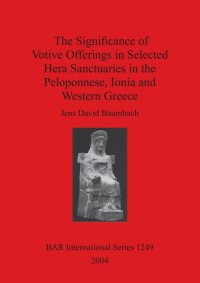
Ebook: The Significance of Votive Offerings in Selected Hera Sanctuaries in the Peloponnese, Ionia and Western Greece
Author: Jens David Baumbach
- Series: BAR British Archaeological Reports International Series 1249
- Year: 2004
- Publisher: BAR Publishing
- Language: English
- pdf
A visit to the Samian Heraion can be a disappointment as the remains of what was one of the most important sanctuaries in antiquity are scanty. The buildings have been plundered down to their foundations and, after excavation, a large part of the remainshad to be covered up again in order to protect them from being destroyed by vegetation. Thus, a lot is left to the visitors' imagination. Since the Heraion is rarely referred to in ancient texts, our knowledge of it almost exclusively derives from the analysis of archaeological evidence. On the basis of the study of its architecture, it is possible to visually reconstruct the sanctuary, but what about the reconstruction of its cult? The significance of votive offerings as a source that provides insight into cult characteristics has often been underestimated. In this study, significant votive finds from various periods from six Hera sanctuaries are examined to find out both their specific and shared cult aspects. In the Peloponnese, the Heraia at Perachora, Argos and Tiryns are explored, and the Samian Heraion provides an insight into Hera's cult in Ionia; the analysis of the Heraia at Poseidonia – Paestum affords a study of two Hera sanctuaries belonging to the same polis. To shed light on the nature of the cults, the Heraia are considered on the basis of five fundamental cult aspects - pregnancy, childbirth, and growing up; marriage; home and family; agriculture and vegetation; and military aspects. The final chapter compares the evidence to try and define the individual, polis, and pan-Hellenic characteristics of the six sanctuaries under consideration.